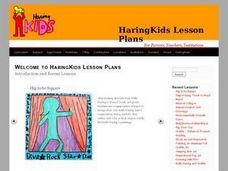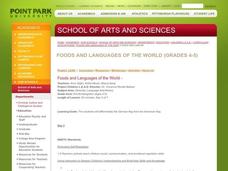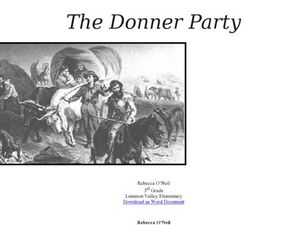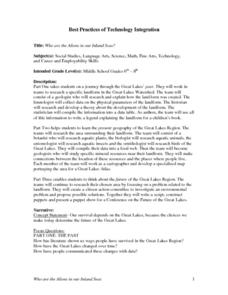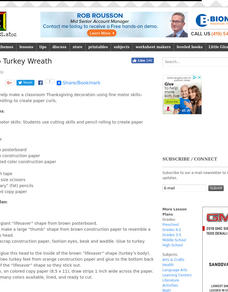Curated OER
The Little Engine that Could Mini Unit Plan
The best part about teaching little ones is setting up fun, thematic learning stations. Here is a full day of activities that all relate to the story, The Little Engine that Could. Included are six different activities that cover...
Curated OER
Agriculture Shapes Kentucky History
Young scholars explore the lives of early American Indians and settlers in Kentucky. They describe the agricultural practices of Indians native to Kentucky and develop a supply list for a group of settlers coming to the state to...
Curated OER
Critical Listening: Music Vocabulary
The school band or orchestra analyzes their own performance after exploring musical terminology. They listen to a classical piece and describe it using only words. They look up musical terminology and then use those words to compare and...
Missouri Department of Elementary
Ingredients of a Relationship Recipe
An eye-catching hook makes a smart analogy between ingredients for a food recipe and ingredients for quality relationships. Scholars discuss and list qualities they feel contribute to positive interactions. Pupils create a recipe card...
Curated OER
Our Daily Five
Students explore the food pyramid through a class discussion, hands-on experience with food items, and a floor game that helps them to identify the food group involved. Lesson extensions include the use of play money, art, and dance.
Curated OER
Mixing Up Magic
Students explore the relationship between art and science through experimenting with color, design and recycled materials and creating their own art work.
Curated OER
My Own Holiday
Students investigate holiday traditions by participating in class celebrations. In this St. Patrick's day lesson plan, students discover the history of St. Patrick, the religious context of the holiday, and the fine foods and traditions...
Curated OER
Sand and Water
Students follow this recipe for fun clay creations. In this early childhood art and science activity, students develop creative-thinking skills, fine-motor skills, and sensory awareness while they make, mold, and decorate salt dough.
Curated OER
Foods and Languages of the World
Students compare and contrast the German flag to the American flag. For this diversity lesson, students view an example of the German flag and American flag. Students list the differences and similarities between both flags. Students...
Twiggle Magazine
Preschool Color Fun and Activities
I can't stress enough the importance of songs and rhyming chants to the development of early literacy skills. To reinforce color recognition, little ones sing, count, move, and create. All you have to do is choose which of these great...
Scholastic
Presenting Persuasively (Grades 6-8)
Teens and pre-teens are a prime target for advertisers, so how are they doing it? An interactive lesson highlights the strategies used by advertisers, such as visual imagery and verbal clues. Then, a short writing assignment puts those...
Curated OER
The Donner Party
Who is the Donner Party? Find out why this group of pioneers lives in infamy. A lot of information is provided in this resource, but you will have to copy and paste the text to acquire the handouts. Learners will look at primary sources,...
Curated OER
Letter of Complaint
Learners analyze this letter of complaint to the city council by answering nine short-answer questions. They examine author's purpose, word choice, claims, rhetorical questions, and general observations. There is a focus on constructive...
Great Schools
Letter of Complaint
If you've ever received bad service or disagreed with a company's decision, writing a letter of complaint might be a good skill to have. Review the format of a letter, author's purpose, and other aspects of persuasive writing with an...
Curated OER
Who Are the Aliens in Our Inland Seas?
Middle schoolers work in teams to research specific landforms in Great Lakes Watershed, compile information into data table, and write legend explaining landform for children's book. Students then research area surrounding landform,...
Curated OER
Something's Fishy. . . Classes and Qualities of Fish and Seafood
If you are going to eat seafood, it helps to understand the different classifications. In this presentation, viewers learn to differentiate two types of finfish and the variations of edible shellfish. They also examine the...
Curated OER
Group Turkey Wreath
Students practice the fine motor skills of cutting and rolling as they make a whole class Thanksgiving wreath. They cut strips of paper and roll them on a pencil to make curls to add to a turkey wreath.
Curated OER
Activity Plan 3-4: Scrumptious Shapes
Students discover together that shapes are everywhere - even in the food we eat. In this early childhood math and art lesson, students read about shapes, identify foods that match geometric shapes, and create a class book.
Curated OER
A Small Book of Small Things
Young scholars explore size relationships as they collect pictures of the small things in their world. In this early childhood math and literacy instructional activity, students gain an understanding of size differences and develop...
Curated OER
Country Life City Life
In this dialogue worksheet, students read a dialogue which compares the city life with the country life. The students use the dialogue to answer 10 multiple choice questions.
Curated OER
Tiny Dragons of the Sea
For this reading for information worksheet, students apply comprehension and vocabulary usage skills. In this matching and short answer worksheet, students answer fifteen question.
Curated OER
Preposition Worksheet 1
In this grammar worksheet, students fill in forty blanks with the appropriate preposition that makes each one grammatically correct.
Curated OER
The Writing Suitcase
In this literacy worksheet, learners are given information to take home ot parents in order to offer scaffolding support for students to complete writing samples for sharing in class.
Curated OER
Making Inferences
In this literature worksheet, 5th graders focus on making inferences. Students study 5 quotations from the story and respond to 2 short answer questions, drawing inferences from the information that is stated.







